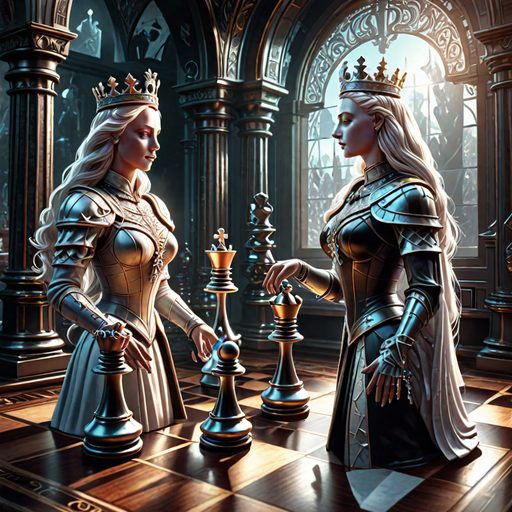
Checkmate: More Than Just a Word
Recommended for Preparatory Grades
Chess, a game of strategy and intellect, has captivated minds for centuries. At its heart lies a simple yet powerful word: checkmate. This word signals the end of a game! The triumph of one player and the utter helplessness of the other.
But where did this word come from? And how has it infiltrated our everyday language? Let’s embark on a journey through time and language to uncover the secrets of checkmate.
The Birth of Checkmate in Ancient Persia
Imagine a bustling marketplace in ancient Persia, where merchants haggle over spices and silks, and scholars engage in lively debates. Amidst this vibrant scene, a new game is taking shape! A game of kings and queens, knights and pawns, all vying for supremacy on a checkered battlefield. This game, we now know as chess, would soon spread across the globe. And it would carry with it a word that would become synonymous with victory and defeat: checkmate.
In the early versions of chess, capturing the king was the ultimate goal. However, as the game evolved, a new rule emerged: the king could not be captured, only threatened. This led to the concept of “check,” a warning that the king was under attack. When a player’s king was trapped with no legal moves to escape, the Persian phrase “shāh māt” was declared, signifying the king’s helplessness and the end of the game.
This phrase, over time, evolved into the English word “checkmate.” The introduction of checkmate transformed chess from a game of brute force to a game of strategic maneuvering. Players had to anticipate their opponent’s moves and protect their king at all costs.
The Evolution of Checkmate: From Persia to the World
As chess spread from Persia to other parts of the world, the word “checkmate” followed, adapting to different languages and cultures. In Arabic, it became “shah mat,” while in French, it evolved into “échec et mat.” Chess quickly gained popularity across Europe, Asia, and Africa, becoming a favorite pastime of kings, queens, and commoners alike. The word “checkmate” became a universal symbol of victory, transcending language barriers.
Chess masters developed intricate strategies and tactics to achieve checkmate, turning the game into a complex and fascinating art form. Checkmate patterns, such as the Fool’s Mate and the Scholar’s Mate, became legendary for their elegance and efficiency.
The word “checkmate” found its way into literature, often used as a metaphor for a decisive victory or a situation where someone is cornered with no way out. Shakespeare, in his play “Macbeth,” famously wrote, “Checkmate to the devil’s game.”
Checkmate in the Modern World: A Metaphor for Victory and Defeat
In today’s world, the word “checkmate” has transcended its chess origins! And it has become a part of our everyday vocabulary. We use it to describe a wide range of situations, from political victories to personal triumphs. When a politician outmaneuvers their opponent and secures a decisive victory, we might say they have delivered a “checkmate.” This term is often used in the context of elections, debates, or legislative battles.
In the competitive world of business, companies strive to gain an advantage over their rivals. A successful product launch or a strategic acquisition can be seen as a “checkmate” move. Thus, putting a company in a dominant position.
Even in our personal lives, we may encounter situations where we feel “checkmated.” Perhaps we are facing a difficult decision with no good options, or we are trapped in a relationship that seems to have no way out. The word “checkmate” has a rich and fascinating history, spanning centuries and continents. It is a word that evokes both triumph and despair, a word that has captivated minds and sparked countless battles on the chessboard and beyond.
As we continue to play the game of life, we may find ourselves facing our own checkmates, moments where we are forced to confront our own limitations and make difficult choices. But even in these moments, we can take solace in the knowledge that the game is not over until the final move is made.
Watch a video
Chess Unveiled: Your Move to Mastery Starts Now!
Curious Times is a leading newspaper and website for kids. We publish daily global news aligned to your learning levels (also as per NEP 2020): Foundational, Preparatory (Primary), Middle and Senior. So, check out the News tab for this. We bring kids’ favourite Curious Times Weekly newspaper every weekend with top news, feature stories and kids’ contributions.
Curious Times News Program for Schools for FREE. Over 5,000 schools and teachers from all over the world have joined our programme so that students and teachers can get FREE Educative Newspaper. Here, kids can take part in world events and win prizes and certificates for free through their schools.
The following social media platforms allow you to communicate with us: Instagram.
0 (Please login to give a Curious Clap to your friend.)
